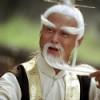-
Content count
248 -
Joined
-
Last visited
-
Days Won
2
About Eduardo
-
Rank
Dao Bum
Profile Information
-
Gender
Male
Recent Profile Visitors
-

2024 Year of the Dragon front page logo request
Eduardo replied to Gerard's topic in Forum and Tech Support
-

Jing Replenishment: The Rooted Path Revelation
Eduardo replied to The Biggest Nobody's topic in Daoist Discussion
. -

2024 Year of the Dragon front page logo request
Eduardo replied to Gerard's topic in Forum and Tech Support
. -

2024 Year of the Dragon front page logo request
Eduardo replied to Gerard's topic in Forum and Tech Support
. -

2024 Year of the Dragon front page logo request
Eduardo replied to Gerard's topic in Forum and Tech Support
. -
I refer to other people and situations since I do not know you enough to form an idea of you, which would be hasty.
-
Possibly a collective mind has been created in the forum that is very resistant to the rudeness of dilettantes and a fraud detector has also been developed.
-

2024 Year of the Dragon front page logo request
Eduardo replied to Gerard's topic in Forum and Tech Support
. -

I found a system that might be better than mo pai for gaining physical strength
Eduardo replied to Mana conduit's topic in Systems and Teachers of
Cultivate genuine modesty and discard haste, the desire for fame and recognition As Lao-Tzu said "Those who speak do not know, those who know do not speak." -

I found a system that might be better than mo pai for gaining physical strength
Eduardo replied to Mana conduit's topic in Systems and Teachers of
It's strange, the same thing happened to me, there is a certain annoying noise that doesn't give me a good feeling. -

The trinity - how do you interpeted it
Eduardo replied to NaturaNaturans's topic in Abrahamic Religions Discussion
-

2024 Year of the Dragon front page logo request
Eduardo replied to Gerard's topic in Forum and Tech Support
. -

2024 Year of the Dragon front page logo request
Eduardo replied to Gerard's topic in Forum and Tech Support
.








